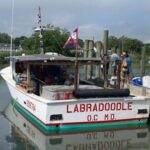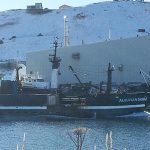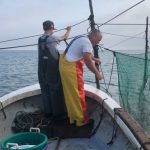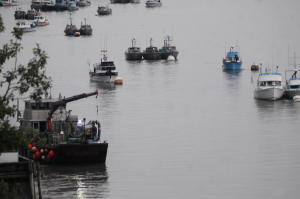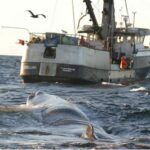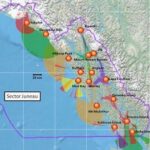Tag Archives: Stony Brook University
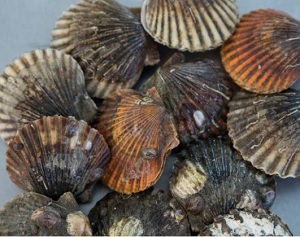
Peconic Bay scallops die-off tied to newly detected parasite
The catastrophic die-off of Peconic Bay scallops in eastern Long Island waters may be tied to a previously undetected parasite that can infect the kidneys of adult and juvenile scallops, state regulators reported Friday. The specific parasitic organism, known as coccidian parasite, was discovered in kidney tissue of all 32 scallops collected and sampled from Shelter Island’s Hay Beach last November, >click to read< 16:28
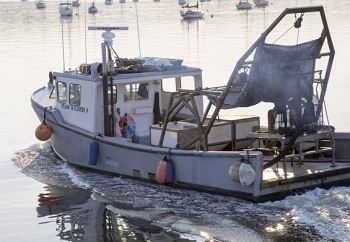
Long Island: Study to assess whether shellfish dredging affects Oyster Bay Harbor
Researchers from Stony Brook University plan to study how mechanical shellfish harvesting kicks up sediment in Oyster Bay Harbor over the coming year. How the sediment affects the environment under the waves is a hotly contested issue that could impact negotiations for a new lease on the town’s shellfish beds. Baymen, independent shell fishermen, allege that shellfishing company Frank M. Flower & Sons Inc.’s methods are damaging the environment. The company’s lawyer said he expects the study to show their methods are safe. >Click to read< 16:25
The Bunker Resurgence: The Good News Beyond Recent Fish Kills
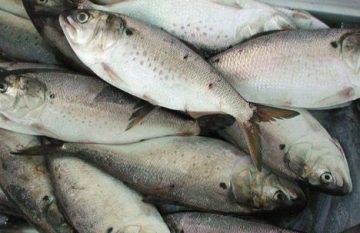 According to Megan Ware, Fishery Management Plan Coordinator of the Atlantic States Marine Fisheries Commission in Arlington, Virginia, “Results of the 2015 stock assessment indicate that the [menhaden] stock is not overfished, and overfishing is not occurring.”Joe Warren, an associate professor with the School of Marine and Atmospheric Sciences at Stony Brook University, agrees. Professor Warren’s lab uses acoustics to estimate the biomass (weight) of menhaden in the Peconic River and Flanders Bay. That’s essentially the same technology recreational fishermen employ using fishfinders.,,, Warren further observed that each of the surveys encountered anywhere from five to 25 schools that could range from hundreds to tens of thousands of fish. The professor cited anecdotal evidence that there are more bunker in New York waters as humpback whales off the Atlantic coast on the south side of Long Island have been observed feeding on bunker during the past several years. click here to read the story 15:37
According to Megan Ware, Fishery Management Plan Coordinator of the Atlantic States Marine Fisheries Commission in Arlington, Virginia, “Results of the 2015 stock assessment indicate that the [menhaden] stock is not overfished, and overfishing is not occurring.”Joe Warren, an associate professor with the School of Marine and Atmospheric Sciences at Stony Brook University, agrees. Professor Warren’s lab uses acoustics to estimate the biomass (weight) of menhaden in the Peconic River and Flanders Bay. That’s essentially the same technology recreational fishermen employ using fishfinders.,,, Warren further observed that each of the surveys encountered anywhere from five to 25 schools that could range from hundreds to tens of thousands of fish. The professor cited anecdotal evidence that there are more bunker in New York waters as humpback whales off the Atlantic coast on the south side of Long Island have been observed feeding on bunker during the past several years. click here to read the story 15:37
Fish fight: Scientists battle over the true harm of mercury in tuna
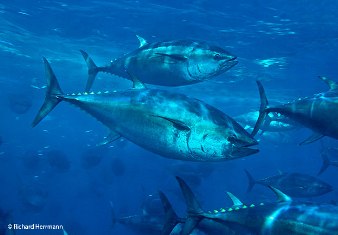 Molly Lutcavage thought she had a deal. For more than a decade, she had collected hundreds of tissue samples from bluefin tuna in hopes of settling a question that has long vexed pregnant women and the parents of young children: Should they eat the big fish, a beneficial source of protein and fatty acids? Or did mercury contamination make them too dangerous? Lutcavage hoped to test the theory that selenium, a key chemical found in tuna, prevents mercury from being transferred to the people who eat them and that, therefore, the fish are safe to eat. So she gave her hard-won samples to a colleague, Nick Fisher, to analyze in his lab. But Fisher, it seems, didn’t have as much interest in Lutcavage’s selenium theory. Two years later, he produced a study focused almost exclusively on his own hypothesis: that lowering pollution emissions from power plants reduced the levels of mercury in bluefin tuna. Lutcavage was furious, and the two scientists went to war. continue reading the article here 14:55
Molly Lutcavage thought she had a deal. For more than a decade, she had collected hundreds of tissue samples from bluefin tuna in hopes of settling a question that has long vexed pregnant women and the parents of young children: Should they eat the big fish, a beneficial source of protein and fatty acids? Or did mercury contamination make them too dangerous? Lutcavage hoped to test the theory that selenium, a key chemical found in tuna, prevents mercury from being transferred to the people who eat them and that, therefore, the fish are safe to eat. So she gave her hard-won samples to a colleague, Nick Fisher, to analyze in his lab. But Fisher, it seems, didn’t have as much interest in Lutcavage’s selenium theory. Two years later, he produced a study focused almost exclusively on his own hypothesis: that lowering pollution emissions from power plants reduced the levels of mercury in bluefin tuna. Lutcavage was furious, and the two scientists went to war. continue reading the article here 14:55
Warming waters a major factor in the collapse of New England cod, study finds
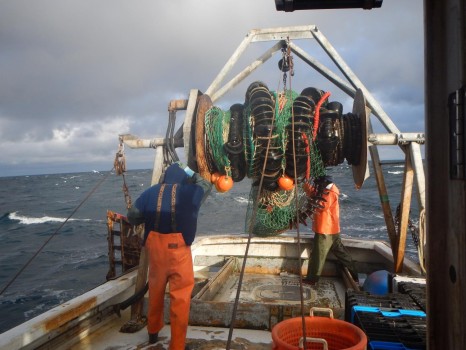 Pershing and colleagues from GMRI, the University of Maine, Stony Brook University, the Bigelow Laboratory for Ocean Sciences, and NOAA’s Earth System Research Laboratory, including the Cooperative Institute for Research in Environmental Sciences at the University of Colorado Boulder, found that increasing water temperatures reduce the number of new cod produced by spawning females. Their study also suggests that warming waters led to fewer young fish surviving to adulthood. Read the rest here 18:04
Pershing and colleagues from GMRI, the University of Maine, Stony Brook University, the Bigelow Laboratory for Ocean Sciences, and NOAA’s Earth System Research Laboratory, including the Cooperative Institute for Research in Environmental Sciences at the University of Colorado Boulder, found that increasing water temperatures reduce the number of new cod produced by spawning females. Their study also suggests that warming waters led to fewer young fish surviving to adulthood. Read the rest here 18:04

































